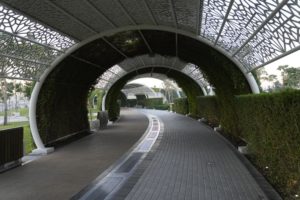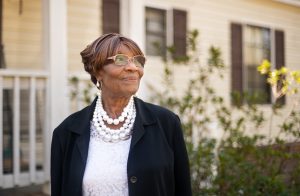Alexander Demidenko, who guided refugees back to their homeland, was arrested and tortured by Kremlin forces. One of the many he helped recalls his courage and kindness
Lost and disoriented, Olena Primak stood at Belgorod’s train station, holding tightly to her young daughter’s arm. The scorching summer heat and the long journey had left the Ukrainian refugee on the brink of collapse. Primak had been told to wait for a Russian volunteer called “Alexander” who would help her get back to Ukraine.
“Suddenly, a man with the most generous of smiles appeared at the station,” she recalled. With a gentle countenance, warm eyes and grey hair, the 61-year-old Alexander Demidenko approached Primak, offering to take her bags.
After living over a year under Russian control in the southern Ukrainian town of Novaya Kakhovka, Primak, a former shopkeeper, decided in June 2023 that she could no longer bear foreign occupation. “We had to endure a series of long, cramped train rides through Russia, trying to hide that we are Ukrainians so we wouldn’t get in trouble,” Primak said, describing a journey that also included a “nightmare” passing through one of Russia’s notorious filtration camps.
To get back to Ukrainian-controlled land, she had to now cross the Kolotilovka checkpoint, the only passage for Ukrainian citizens returning to their homeland. “Thank God Alexander [Demidenko] was there to help us at the end of it.”
Since the start of the war over two years ago, a discreet network of unofficial Russian volunteers like Demidenko has sprung up that have helped tens of thousands of Ukrainian refugees displaced by the war to get out of Russia. Many of the Ukrainians were forcibly deported to Russia or ended up in the country after finding no safe way to travel west into Ukraine. The volunteers, often ordinary anti-war Russians looking for ways to express how they feel about the conflict, operate largely through word of mouth and groups on the Telegram messaging app.
On the drive to the border, Demidenko distracted her “with anecdotes about life and history of the towns we passed,” Primak recalled. “It was something extraordinary. This man I have never met before made me feel at ease. His love of life was infectious.”
Upon reaching the border, the two bid farewell to each other. Demidenko gave his number, telling Primak her family was always welcome once the war was over. But Primak was never able to thank him for his help. Demidenko died last Friday in pre-detention custody in Belgorod where he had spent six months awaiting trial on charges of illegal gun possession, which his family and friends say were politically motivated as retribution for his volunteer efforts.
People who knew Demidenko, fellow volunteers and Ukrainian refugees whom he has aided, portray him as a man of unwavering commitment to helping those in distress, despite the risks faced in wartime Russia.
A staunch pacifist, he started working in the rocket design industry before turning to teaching history and geography at school, a job he loved. To make ends meet from a meagre salary, Demidenko sold foreign language textbooks on the side, a job through which he met his wife, Natalia Vishnevskaya, in 2014.
“I considered myself lucky to have met him. I couldn’t believe there could be that many good qualities in one man,” said Vishnevskaya. “He was well-read, intelligent and wrote beautiful poems. But he was also a man of the land who loved to get his hands dirty.”
His adult son, Oleg, who lives in the Czech Republic, described his father as “stubborn to the extreme”, who would always put his principles above his safety or personal relations. When Russia adopted the controversial foreign agent bill aimed to tackle independent media and NGOs, Oleg recalled how his father hung up a note on his car in solidarity that read “I am a foreign agent.”
For more Guardian journalism follow this channel
Together with Vishnevskaya, Demidenko bought a house in Gremyachi, a sleepy village near the Ukrainian border, envisioning a quiet future together. But their plans, like the faiths of millions of people in both Ukraine and Russia, changed abruptly when Vladimir Putin ordered his troops to invade Ukraine in February 2022.
On the day of the invasion, Demidenko staged a one-man protest in central Belgorod against the war. Soon after, the couple decided that they would aid Ukrainian refugees. “And we never doubted the decision once,” said Vishnevskaya.
Their home quickly transformed into a stopping point for hundreds of Ukrainians. As Russia occupied more of Ukraine, more people came. “We lost count of how many people have stayed with us,” said Vishnevskaya, who estimated that in total Demidenko had helped over 900 Ukrainians. The couple saw their biggest influx of refugees in the summer of 2023 when occupied regions of Ukraine became flooded by the destruction of the Kakhovka Dam.
When the house got too crowded with refugees – at one point the family hosted as many as 27 people in their two-storey house – Demidenko slept in the small wooden banya adjacent to the main house.
He would spend his days driving refugees to the border, becoming a fixture among the local volunteer community and a growing thorn in the eyes of the authorities. On social media, he rallied against taxi drivers who charged big sums to drive refugees to the border, while also claiming that officials had been demanding money for fast-tracking people through the queues.
Officially, the volunteers’ activities are not illegal. But the Russian security services have cracked down on non-government volunteers, whose work helping Ukrainians return went against the official narrative that Moscow was “evacuating” and “protecting” them. Since Demidenko’s arrest, other activists have been harassed, threatened or arrested. “He was not hiding his work. The opposite, he was very proud of it. It was impossible for the authorities not to know what he was doing,” said Anastasia, a Russian volunteer who knew Demidenko but asked for her name to be changed because she continued her work.
Anastasia said that volunteers who transport refugees to the Russian border face the steepest risk as they are the ones interacting directly with the authorities.
On 17 October 2023, Demidenko drove an elderly Ukrainian lady with cancer to the border, on what would prove to be his last trip. There, he was arrested by members of the Chechen Akhmat battalion, a notorious unit which has been stationed in Belgorod since the summer of 2023.
Demidenko went missing for 10 days before he was placed in pre-trial detention for alleged illegal weapons possession. In a phone call to his son, Demidenko described being tortured by the Akhmat forces, who he said forced him to confess to the charge. Vishnevskaya also published photographs of her husband in court which showed signs of torture on his body.
Demidenko’s final days remain a mystery. Prison authorities say he died on 5 April. The local Belgorod Bel.ru outlet reported this week citing prison officials that his cause of death was suicide. But Demidenko’s official death certificate, seen by the Observer, states that the cause of death “was not yet established”.
His family has cast doubt on the suicide version, arguing that Demidenko was making plans for the future. They are waiting for the investigation to conclude, though those around him express little doubt that the state is ultimately to blame for his demise.
“He was a free man in all of his actions and would have been alive if he wasn’t arrested,” said Oleg. “You just can’t be that free in Russia today.”




